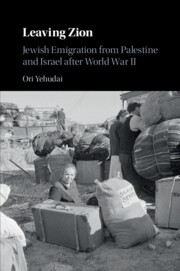Book contents
4 - Debating and Restricting Emigration
Published online by Cambridge University Press: 24 April 2020
Summary
In response to the emigration crisis, the Israeli government introduced in late 1953 a series of administrative measures aimed to reduce emigration and to ensure that those leaving the country would not fall as a burden on Jewish bodies and local authorities abroad. The government also undertook a press propaganda campaign designed to discourage emigration. As part of the campaign, journalists reported to the Israeli public about the miseries of Israeli emigrants abroad, while also denouncing emigration as an act of treason.
Those steps limited the movement of emigrants and helped to entrench their image as social outcasts and traitors. They were also accompanied by extensive public debate about topics such as the fate of the Zionist project in the post-independence period, the political culture of young Israel, and the character of Jews migrating into the country. In addition to creating difficulties abroad, emigration came to the forefront of the national consciousness, serving as a focal point for discussions about fundamental issues in Israeli public life. Although Israel was regarded as a country of Jewish immigration, the nature of the fledgling state was also shaped and understood through the prism of out-migration.
Keywords
- Type
- Chapter
- Information
- Leaving ZionJewish Emigration from Palestine and Israel after World War II, pp. 138 - 180Publisher: Cambridge University PressPrint publication year: 2020

